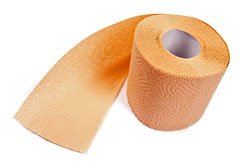Dear Umbra,
The few brands of recycled-content toilet paper available are nasty. Why is it so difficult to manufacture TP that’s not from virgin trees but doesn’t feel like bark on one’s sensitive skin? What exactly is the technological barrier the nation’s scientists must overcome in order to make a roll that’s sensitive, both against our skin and environmentally?
Jennifer Stanley
Oakland, Calif.
Dearest Jennifer,
You’ll be happy and perhaps surprised to learn that there are no technological barriers to creating soft toilet paper from recycled fibers — just barriers to making it as soft as the virgin-tree-on-a-roll brands.

Roll with it, baby.
Photo: iStockphoto
The reason for this difference has to do with the fact that the texture of the starting fibers — whether virgin or recycled — influences the feel of the “end” product. (Ha ha.) Also, the fibers in paper shorten each time they’re recycled, making recycled paper less strong than the virgin variety. To compensate for this, some manufacturers use resins or mechanical means that help the recycled fibers stick together better. But making paper stronger also tends to make it stiffer, bringing us back to your dilemma.
All is not lost, however: just as there are differences in softness between virgin brands, the recycled kind comes in a lot of different forms, some dramatically less sandpapery than others. Fortunately for all but the most sensitive of bums, truly soft (or soft-enough) recycled TP is out there — even the cushy double-ply stuff. For what it’s worth, the U.S. EPA’s federal purchasing guide [PDF] even advises government tissue buyers to “avoid misconceptions about softness, absorbency, and strength. Some recycled-content sanitary tissue products are softer, stronger, and more absorbent.” Though I don’t often turn to the feds for enlightenment, in this case I think they’re right.
Since you likely know all the reasons to buy recycled TP — which boil down to protecting the endangered forests that keep our planet healthy — I’d recommend a new approach. Buy a few brands you haven’t tried and do a series of personal softness tests, keeping in mind the words of one Natural Resources Defense Council activist: “How soft do you need something to be that you use for five seconds a day?” If you find a couple of brands you can live with, choose the one with the highest amount of recycled content and — presto — you can wipe away both your guilt and your discomfort.
If you’re still not satisfied, there are a few things you can do. You could start by writing letters to virgin TP companies telling them you want a soft recycled product and also to recycled TP companies telling them your bum is in distress, so please innovate, post-haste. You might also test some brands of recycled facial tissue on your other end and see if any of those meet your standards. If you want to stick with officially designated TP, I have it on good authority that folding creates a gentler effect than crumpling. And finally: you could always install a bidet attachment. How terribly cosmopolitan.
Any other ideas, readers? Let us know.
Rawly,
Umbra

